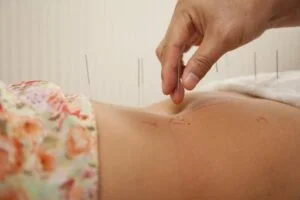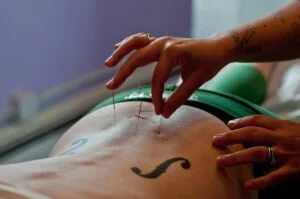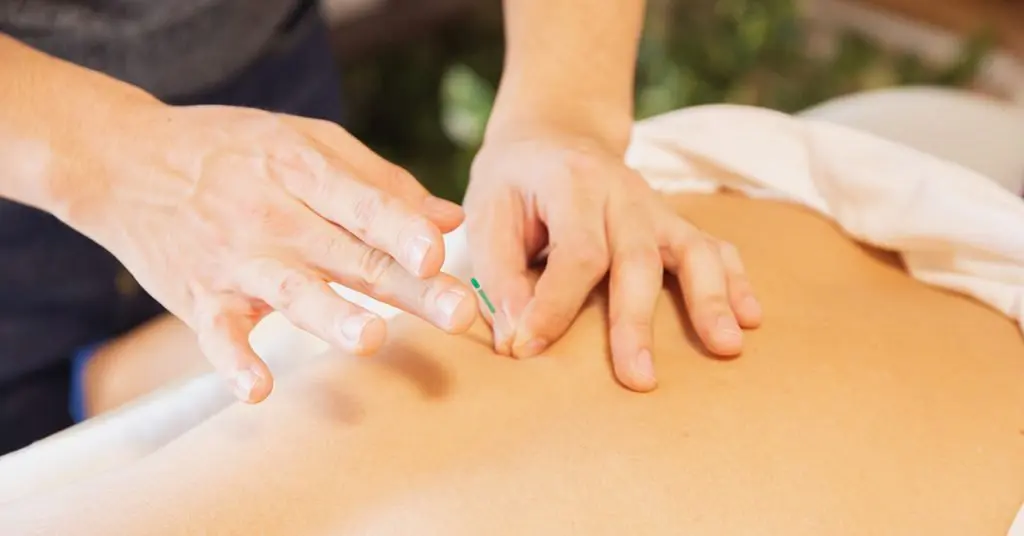Acupuncture, an ancient Chinese healing technique, has gained widespread popularity for its holistic approach to addressing various health concerns. One area where acupuncture has shown promise is in promoting ovarian health. In this blog post, we will delve into the intricacies of acupuncture for ovaries, exploring its potential benefits and how it may contribute to overall reproductive well-being.
Contents
What is Acupuncture?
Acupuncture is a traditional Chinese medical practice that has been in use for thousands of years. It is based on the concept of balancing the flow of vital energy, known as “Qi” or “Chi,” through pathways in the body known as meridians. According to traditional Chinese medicine (TCM), the balance of Qi is crucial for maintaining health, and disruptions or imbalances in this energy flow can lead to various health issues.
How Does Acupuncture Help for Ovarian Health?

Acupuncture is believed to influence ovarian health through various mechanisms that involve the regulation of hormonal balance, improvement of blood flow, reduction of stress, and overall support for reproductive well-being. While the specific effects of acupuncture on ovarian health are still being studied, many individuals report positive outcomes in terms of menstrual regularity, fertility, and the management of conditions affecting the ovaries. Here are some ways in which acupuncture may contribute to ovarian health:
- Hormonal Regulation: Acupuncture is thought to modulate the endocrine system, which plays a crucial role in regulating hormones. For women, hormonal balance is essential for proper ovarian function. By stimulating specific acupuncture points, practitioners aim to regulate hormones such as estrogen and progesterone. This hormonal balance may help address issues related to menstrual irregularities, ovulation, and overall reproductive health.
- Improved Blood Flow to the Ovaries: Proper blood circulation is vital for the health of any organ, including the ovaries. Acupuncture is believed to enhance blood flow to the reproductive organs, including the ovaries. Improved blood circulation may contribute to better oxygenation and nutrient supply to ovarian tissues, supporting their health and function. Additionally, enhanced blood flow may facilitate the removal of toxins and metabolic by-products from the ovaries.
- Reduction of Stress: Stress can have a significant impact on reproductive health by disrupting hormonal balance and affecting ovarian function. Acupuncture is well-known for its stress-reducing effects. When specific acupuncture points are stimulated, the body releases endorphins, which are natural stress relievers. By reducing stress levels, acupuncture may indirectly support ovarian health and improve conditions such as irregular menstrual cycles and fertility issues.
- Supporting Egg Quality: Acupuncture is often explored as a complementary therapy for individuals undergoing fertility treatments. Some studies suggest that acupuncture may improve the quality of eggs, potentially increasing the chances of successful conception. By creating a favorable environment for egg development and maturation, acupuncture may play a supportive role in fertility.
- Management of Ovarian Conditions: Acupuncture is considered by some individuals as a complementary therapy for managing specific ovarian conditions, such as polycystic ovary syndrome (PCOS) or ovarian cysts. While not a standalone treatment, acupuncture may help alleviate symptoms associated with these conditions by addressing underlying imbalances and promoting overall well-being.
- Regulation of Menstrual Cycles: Irregular menstrual cycles can be indicative of hormonal imbalances or other reproductive issues. Acupuncture is believed to help regulate menstrual cycles by influencing hormonal levels and promoting balance within the reproductive system. Regular acupuncture sessions may contribute to more predictable and healthy menstrual cycles.
Techniques of Acupuncture for Ovaries
Acupuncture for ovarian health involves the insertion of thin needles into specific acupuncture points on the body. The selection of acupuncture points and the techniques used can vary based on individual health concerns and the goals of treatment. Here are some common techniques employed in acupuncture for ovarian health:
- Needle Insertion: The cornerstone of acupuncture is the insertion of thin, sterile needles into specific acupuncture points on the body. The needles used are typically hair-thin and are inserted to varying depths. This is depending on the location and purpose of the acupuncture point. The insertion is usually painless, and many people report a sensation of warmth, tingling, or relaxation during the process.
- Electroacupuncture: Electroacupuncture involves attaching small electrodes to acupuncture needles to deliver a low-frequency electrical current. This technique is thought to enhance the stimulation of acupuncture points. In the context of ovarian health, electroacupuncture may be used to regulate nerve activity, improve blood circulation, and modulate hormonal responses.
- Moxibustion: Moxibustion is a technique where dried mugwort (Artemisia vulgaris) is burned near or on the acupuncture points. This can be done in various forms, including direct moxibustion (placing a small cone directly on the skin) or indirect moxibustion (placing the burning herb on top of the needle or near the skin). Moxibustion is believed to warm and invigorate the flow of Qi and blood, making it potentially beneficial for ovarian health.
- Cupping Therapy: While not always directly applied to ovarian health, cupping therapy is another traditional Chinese medicine technique that may be used in conjunction with acupuncture. Cupping involves placing cups on the skin to create suction. This technique is thought to promote blood flow and help release tension in the muscles. It also helps in potentially aiding in overall relaxation and well-being.
- Ear Acupuncture (Auriculotherapy): Specific points on the ear are believed to correspond to various organs and systems in the body, including the reproductive system. Ear acupuncture involves the insertion of needles or the application of pressure to these points on the ear. This technique is sometimes used in conjunction with body acupuncture to address specific concerns related to ovarian health.
- Acupressure: Acupressure involves applying pressure to acupuncture points without the use of needles. This technique can be performed by the acupuncture practitioner or self-administered by the individual. Acupressure may be used to complement acupuncture sessions and can be a practical way to continue treatment at home.
- Heat Therapy (TDP Lamp): Some acupuncture practitioners use a TDP lamp during treatment. This lamp emits infrared radiation and is believed to have therapeutic effects, including promoting blood circulation and relaxing muscles. While not a direct acupuncture technique, the use of heat therapy may complement acupuncture sessions for ovarian health.
Sources To Find Acupuncture for Ovarian Health
![]()
Keep in mind that it’s essential to choose reputable and qualified practitioners. Here are some general sources where you can find acupuncture services online:
- Local Acupuncturist Directories: Check local directories, such as Yelp, Google Maps, or health service directories, to find acupuncturists in your area. Many directories offer reviews and ratings from other patients.
- Online Platforms: Explore online platforms that connect patients with healthcare providers. Websites like Zocdoc, Healthgrades, or Vitals may have listings for acupuncturists.
- Professional Associations: Visit the websites of professional acupuncture associations. These are such as the American Association of Acupuncture and Oriental Medicine (AAAOM) or the British Acupuncture Council. They often provide directories of qualified practitioners.
- Telehealth Platforms: With the rise of telehealth services, some acupuncture practitioners offer virtual consultations. Platforms like HerMantra or Amwell may have licensed acupuncturists providing online services.
- Health and Wellness Apps: Explore health and wellness apps that connect users with alternative medicine practitioners. Apps like HerMantra or Soothe may have listings for acupuncture services.
- Clinic Websites: Many acupuncture clinics have websites where you can find information about their services, practitioners, and contact details.
- Referrals from Healthcare Professionals: Consult with your primary healthcare provider or gynecologist for recommendations. They may be able to refer you to reputable acupuncture practitioners with expertise in reproductive health.
Limitations of Acupuncture for Ovarian Health

While acupuncture is often considered a safe and effective complementary therapy for various health issues, including ovarian health, it’s essential to recognize that it has its limitations. Here are some considerations and limitations associated with acupuncture for ovarian health:
- Limited Scientific Evidence: Despite the growing interest in acupuncture and its potential benefits for ovarian health, the scientific evidence supporting its effectiveness is not yet robust. While some studies suggest positive outcomes, more high-quality research is needed to establish a clear understanding of the specific mechanisms and efficacy of acupuncture for ovarian conditions.
- Varied Individual Responses: Responses to acupuncture can vary widely among individuals. What works well for one person may not have the same effect for another. Factors such as overall health, the specific condition being addressed, and individual differences in anatomy and physiology can influence the outcomes of acupuncture treatments.
- Complementary, Not Standalone Treatment: Acupuncture should be viewed as a complementary therapy rather than a standalone treatment for ovarian health issues. It is not a replacement for conventional medical approaches, and individuals with serious medical conditions should consult with healthcare professionals to determine the most appropriate and comprehensive treatment plan.
- Not a Quick Fix: Acupuncture is generally regarded as a gradual and cumulative therapy. It may take several sessions before individuals notice significant changes or improvements in their symptoms. Patience and consistency are key when incorporating acupuncture into a health regimen.
- Not Suitable for All Conditions: While acupuncture may offer benefits for certain aspects of ovarian health, it may not be suitable for all conditions. In cases of severe structural abnormalities or acute medical emergencies, acupuncture is not a substitute for conventional medical interventions such as surgery or pharmaceutical treatments.
Conclusion
In conclusion, while acupuncture presents a promising avenue for promoting ovarian health through hormonal regulation, improved blood flow, and stress reduction, its efficacy is not universally established. Scientific evidence remains inconclusive, and individual responses vary. Acupuncture should be approached as a complementary, not standalone, therapy, emphasizing collaboration with conventional medical care. As a gradual process, patience and consistency are crucial.
Additionally, the competence of the practitioner plays a significant role. Acknowledging its limitations, acupuncture offers a holistic approach, contributing positively to some aspects of ovarian health, but thorough research and consultation with healthcare professionals are essential for informed decision-making.
If you are facing PCOS-related issues, PCOS treatment at HerMantra can help. Book your free trial online Pcos treatment session now.


